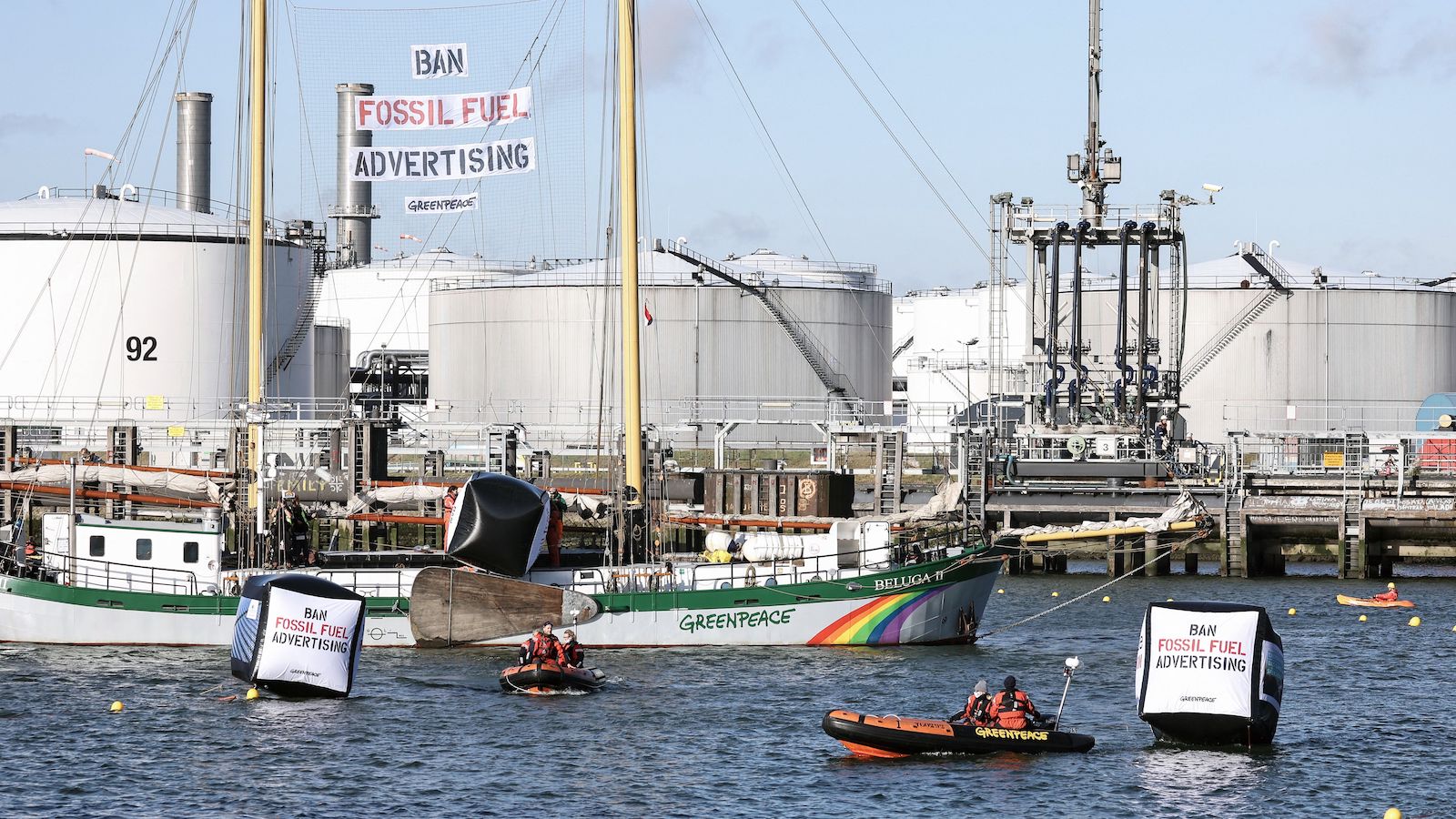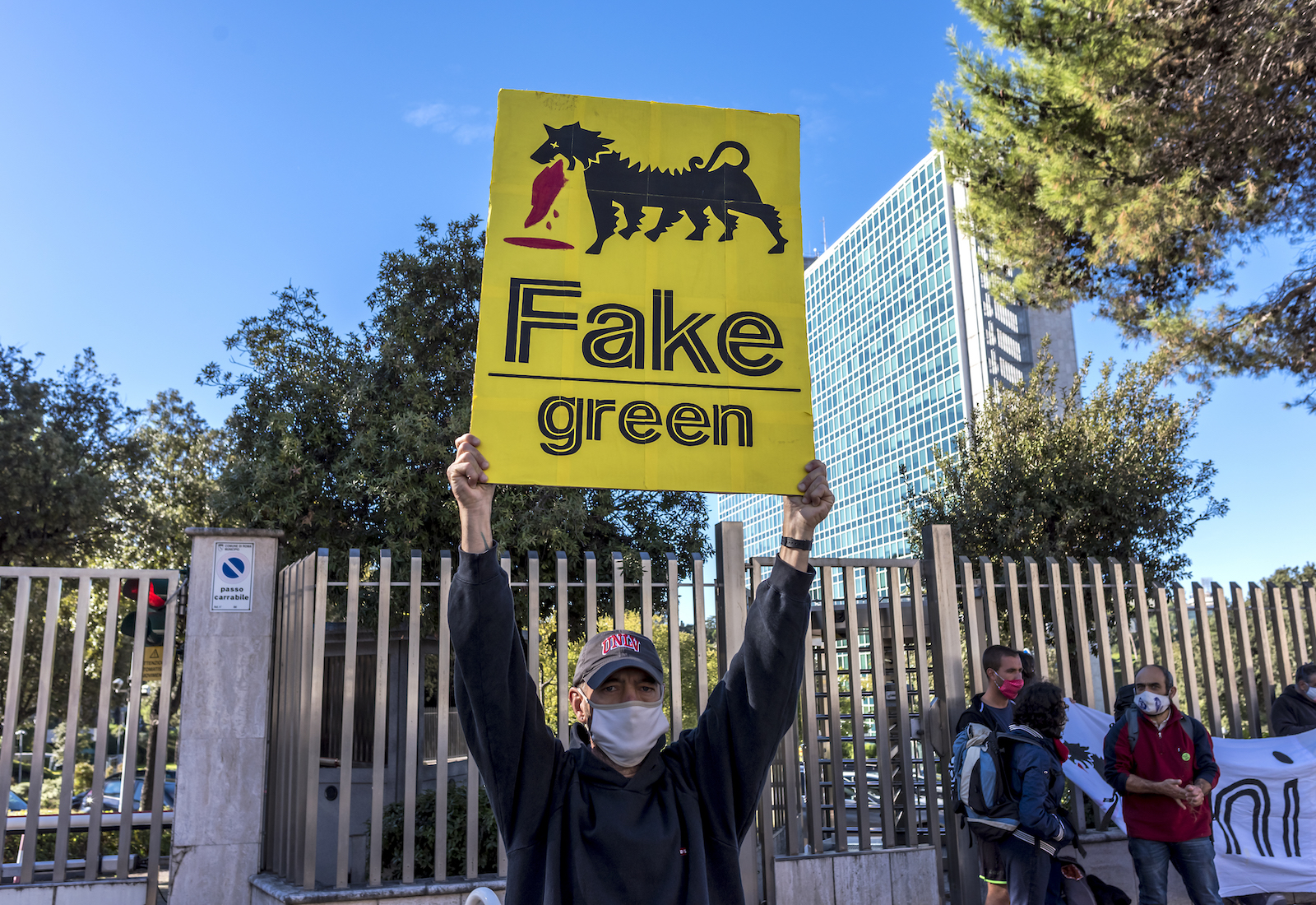European activists want to ban fossil fuel ads. Why can’t we do that here?
Oct 18, 2021
Greenpeace E.U. and 20 other environmental organizations launched a new campaign this month demanding a European Union–wide ban on fossil fuel advertisements. The groups’ proposal would not only prohibit the promotion of coal, oil, gas, gasoline-powered vehicles, airplanes, and so-called “false solutions” — like unrealistic paths to decarbonization — but it would also stop oil companies from advertising altogether. To kick off the effort, dozens of Greenpeace activists descended on Rotterdam to block traffic around Europe’s largest oil refinery.
“Coal and gas = climate chaos,” their signs read.
Across the Atlantic, U.S.-based climate activists applauded the campaign, which they say could help delegitimize fossil fuel companies in the public eye. But differences between American and European law mean that American climate groups would face greater difficulty if they called for an outright ban on fossil fuel advertising. Instead, American advocacy groups have been challenging the content of fossil fuel companies’ advertisements, rather than their very existence.
In any jurisdiction, there’s much to complain about; fossil fuel ads tend to paint an exaggeratedly rosy picture of the industry. According to TV and social media promotions, Exxon is hard at work capturing “the most CO2 of any company.” Shell is “giving back to kids” in its community. And Chevron is “focusing on environmental issues that matter” by monitoring Australian sea turtle hatchlings and “assisting their journey from nest to ocean.”
“These ads are harmful and misleading to consumers,” said Anusha Narayanan, climate campaign manager for Greenpeace USA. While ads make it seem like the companies are working in good faith to address the climate crisis, she explained, the industry reality is actually quite different. Chevron, for example, put just 0.2 percent of its capital expenditures toward developing low-carbon sources of energy between 2010 and 2018. And it’s a similar story for Shell and ExxonMobil, neither of which has heavily invested in renewable energy. As of 2020, none of the 59 major fossil fuel companies had announced climate plans that were in line with the Paris Agreement goal of limiting global warming to 1.5 degrees Celsius (2.7 degrees Fahrenheit).

Kenzo Tribouillard / AFP via Getty Images
According to Narayanan and others, climate-focused advertisements help bolster oil and gas companies’ “social license” to operate — basically, their legitimacy in the eyes of consumers and other stakeholders. By exaggerating their commitment to decarbonization, she said, they can paint themselves green while continuing to sell the very products that cause climate change.
But the U.S.’s protective stance toward freedom of expression means that banning fossil fuel ads outright, as Greenpeace E.U. aims to do, is a nonstarter for American government officials. According to Douglas Kysar, an environmental law professor at Yale, it’s easier for American state and federal authorities to regulate speech by placing stipulations on when, where, or how it can occur than by prohibiting it altogether.
“To ban all speech by a particular actor?” he said. “That’s a very difficult thing to achieve without running afoul of the Constitution.”
When it came to restricting cigarette advertisements, for example, it tooks years of actions from lawmakers and multiple regulatory bodies to achieve today’s sweeping bans. There was the 1964 warning from the U.S. attorney general that smoking causes cancer, and the Federal Cigarette Labeling and Advertising Act that was enacted two years later, requiring tobacco companies to place warning labels on their cigarette packages. There was the 1970 ban on TV and radio ads for cigarettes enacted by Congress. And there was the major 1998 settlement between cigarette manufacturers and dozens of state attorneys general barring cigarettes from being advertised on outdoor billboards or in public transportation in 46 states. More recently, the 2009 Family Smoking Prevention and Tobacco Control Act banned tobacco companies from sponsoring sports and music events, and placed new restrictions on advertising near public schools.
“The more scientific evidence and bipartisan, multi-branch, multi-level government expressions of concern there are about a particular thing,” said Sarah Ludington, director of Duke Law’s First Amendment Clinic, the likelier it is that lawmakers and regulators will be able to overcome First Amendment protections for freedom of expression.

Michael M. Santiago / Getty Images
The political consensus that enabled cigarette advertising restrictions is absent when it comes to fossil fuels — and without it, there’s not much that regulatory agencies can do. Since 1980, government bodies have had to meet four criteria in order to regulate what is known as “commercial speech” — which is not fully protected by the First Amendment. First, they must show that advertisements’ messaging is misleading. Then they must prove that the government has what Kysar called a “legitimate state interest” in curtailing the messaging. They must then show that their proposed regulation materially advances that interest, and they must pass a “least restrictive means” test, demonstrating that they are only suppressing as much speech as is necessary to meet the state interest.
Although fossil fuels pose an even greater threat to public health than smoking, Kysar said it would be hard to justify sweeping restrictions on fossil fuel advertisements without a clearer signal that the federal government is committed to rapidly decarbonizing the economy. “We’re still subsidizing fossil fuel production to the tune of tens of billions of dollars per year,” Kysar said. “If they tried to simultaneously ban the advertisement of fossil fuels while they are still perfectly lawful and heavily subsidized, that’s not gonna look like a legitimate state interest.”
According to Ludington, it’s not even clear which U.S. agency would be able to impose a fossil fuel ad ban — even if the political stars were to align. Whether it’s the Environmental Protection Agency, or the Federal Trade Commission, or FTC, the U.S.’s consumer protection agency, she said, they’d likely have to get specific authorization — from an act of Congress, for example, or from a presidential executive order.
Given these constraints, American climate advocacy groups concerned about misleading fossil fuel advertising have tried two main tactics so far. The first is to bring tort and consumer protection lawsuits against fossil fuel companies for greenwashing. These lawsuits only tangentially demand changes to companies’ advertising practices; they mostly seek compensation for financial, physical, or emotional damages caused by fossil fuel companies’ misleading or fraudulent claims.
The second tactic is to ask the FTC to enforce its “Green Guides” — a set of truth-in-advertising guidelines related to environmental claims — against specific companies. Perhaps the most prominent U.S. effort to target fossil fuel advertisers is a complaint filed by Greenpeace USA, Earthworks, and Global Witness, which asked the FTC to bar Chevron from overplaying its renewable energy investmentsIf successful, the FTC case could compel Chevron to change the content of its advertisements.
Back in Europe, Greenpeace E.U.’s proposal to ban fossil fuel advertisements hinges on a tool called the European Citizens’ Initiative, which allows any group of citizens to launch a petition to be considered by the European Commission. If a petition gets 1 million signatures across seven E.U. countries in a one-year period, the commission is forced to evaluate it and consider preparing a proposal for lawmakers.* The strategy has already shown promise in one Greenpeace-backed campaign calling for a pesticide ban, and another demanding an end to the use of cages for farm animals.

Stefano Montesi – Corbis / Getty Images
“The European Citizens’ Initiative allows people to mobilize, grab the mic, and insist on change happening,” said Paul Musiol, a communications officer for Greenpeace E.U. The closest thing the U.S. has to that is state ballot initiatives or referendums, which are by definition incapable of proposing federal legislation, although they have helped push forward many significant environmental policies.
Silvia Pastorelli, a climate and energy campaigner for Greenpeace E.U., emphasized that activists, policymakers, and regulators across jurisdictions should make use of all available strategies to hold the fossil fuel industry accountable for its deceptive advertising practices. Amsterdam, for instance, outlawed fossil fuel advertising in its metro system in May, and France passed a climate bill that will prohibit advertisements for coal, oil, gas, and gasoline-powered cars starting in 2022. She also mentioned the international Clean Creatives campaign, which pressures advertising agencies to drop their fossil fuel clients.
“There are a lot of different ways in which people are challenging the fossil fuel industry’s dominance,” she said.
Kysar agreed, adding that many of these approaches’ value lay in their symbolic nature. Even if the E.U. campaign might be unsuccessful in the U.S. legal context, he said, it could still help erode the fossil fuel industry’s social license to operate, turning oil and gas “from a lawful energy product to something illicit, taboo, the kind of goods that need to be suppressed and banned.”
“Whether or not the strategy succeeds in a formal, legal matter,” he said, “as an advocacy matter, that’s powerful.”
Editor’s note: Greenpeace is an advertiser with Grist. Advertisers have no role in Grist’s editorial decisions.
*Correction: This story originally misdescribed the European Citizens’ Initiative process.
This story was originally published by Grist with the headline European activists want to ban fossil fuel ads. Why can’t we do that here? on Oct 18, 2021.